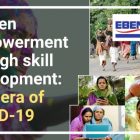Tag Archives: women empowerment
Transforming underprivileged women with micro skills and soft skills
Transforming underprivileged women with micro skills and soft skills
Why do we need to empower women?
Underprivileged. It is a word that comes to mind when we think about those that are worse off in life. People who are not favored by fortune. People who are uneducated and have had access to fewer opportunities in life. But oftentimes, a person’s privileges aren’t all that black and white.
According to the NGO, Initiative for What Works to Advance Women and Girls in the Economy (IWWAGE)’s, survey quoted on Business Insider India, the support for under-privileged women to be financially independent and contributing is evident. 84% of the families surveyed from the Anganwadi hubs are supportive of their women and 72% stated that they would be encouraged in travelling outside their homes for training programs. What’s more, there’s a drive among women themselves, with over 77% of them intending to start small businesses to financially support their families.
However, the issue becomes more complex when we see that the biggest obstacles that cut their dreams short are domestic responsibilities as mothers and sisters, a lack of clear business ideas, as well as a lack of access to seed capital.
When we get to revising the definition of ‘unprivileged women’, we realize that these are women, who although uneducated, and originating from socially backward communities, are just as competent as any other women, but only differ in the sense of facing a unique set of challenges.
March 8th of every year, we celebrate ‘Women Empowerment Day’, better known as ‘International Women’s Day’, a day on which we recognize the journey that is yet to be traveled and changes that need to be made for all Indian women to be able to access the same opportunities and reap success from their lives. The need for women’s empowerment has never been clearer and has shown the potential for women’s economic empowerment to lead to change.
What are macro and micro skills?
In general, macro skills are the largest skill sets that are utilized in a particular context, for example, they are considered to be reading, writing, speaking, and listening. On the other hand, micro-skills are smaller and more individual skills used within a specific area of practice. For example, as an entrepreneur, they may be customer support, product design, digital marketing, operations management, etc.
There are even micro skills within the macro skills, for example, micro skills for speaking are producing clear, audible sounds, and using voice inflections and stress to draw attention to particular words. In reading, the micro skills are the memory of vital parts of a body of text, skimming through text to obtain the main idea, and being actively aware of the use of language to convey varied meanings. In communication, micro skills might be silence, empathy, and non-verbal communication.
Understanding their meanings shows us that these two types of skills show us the breadth and depth of a person’s knowledge through work experience and learning, and are vital in building a person’s profile.
How are hard skills different from soft skills?
Another way of looking at skills is hard skills and soft skills. Hard skills are skills that are taught face-to-face, particularly because they are physical skills, and they are specific to an industry or economic sector. Some examples of this are SEO marketing, computer coding, and prototyping, and they are often learned through training, hands-on experience, or through education.
Soft skills, on the other hand, are non-industry specific, and intangible skills, or interpersonal attributes, are skills that develop naturally without intervention and most importantly, determine how well a person is able to succeed with other peers in the workplace or school. Examples of general soft skills include leadership, communication, and time management.
In the workplace, some of the top soft skills needed to excel are an optimistic attitude, proficient communication in terms of both listening and speaking and a strong work ethic in terms of sticking to deadlines and being diligent with work and responsibility. For students, the soft skills slightly vary, taking into account resilience, a sense of responsibility, and problem-solving.
Another strong differentiator between hard and soft skills is that the level of a person’s hard skills can be measured in terms of numerical value, but soft skills are more difficult to categorize because they are developed in many shapes and forms.
How can underprivileged women develop skills?
Skill development is a vital tool in instilling in underprivileged women, the macro and micro, as well as hard and soft skills in transforming under-privileged women from sole participation in their homes, to being equipped with the skills and resources in order to be able to successfully land jobs, access financial services and buy property, all aspirations of current underprivileged women. Their participation in the economy is crucial to greater stability in the world, earning income to develop their local economies, setting a path for poverty reduction, as well as diminish gender inequality.
Women’s skills development organizations and women’s empowerment training organizations are the foundation in bridging the current market and its needs for underprivileged women seeking to better themselves, their families, and their communities by participating in it. During COVID-19, there was an influx in need for informal, digital work, as many businesses and offices had shut down. Women who had been previously trained, especially in leveraging technology were able to seize this opportunity, communicating with clients online, and using e-payment methods to facilitate transactions.
Why should you donate to Ebendavid Charities?
We, at Ebendavid Charities, are an NGO from Tamil Nadu who have had experience in empowering financially vulnerable women so that they can lead more independent lives on their own terms. One of our initiatives called the UpSkill Center, is aimed at providing skill development courses and training for unemployed, and underprivileged women, irrespective of their caste, religion, or colour.
In addition to enabling women to be active members of our economy, we encourage them to make a positive impact on their families and communities to bring the next generation of women and girls closer to financial freedom and a sense of confidence in them.
On 13/04/2023 Micro skill program was conducted in Thandalam village for a batch of 15 beneficiaries. The Batch was trained to produce Chemical products using the raw material. The products are as follows Soap Oil, Soap Powder, Phenyl, Candel
By donating Rs. 2000 per month only, you support our work in running our Upskill centers and creating change, one community at a time.
Women Empowerment through skill development: in an era of COVID-19

Women empowerment and economic involvement are essential for women’s rights to be strengthened and to take control of their lives and exercise influence in society. Unsustainable progress is impossible without women’s economic empowerment. As a result of achieving gender parity and empowering women, development initiatives expand.
COVID Era
Wage disparities and the responsibility of unpaid care have driven more women out of the labor force and into poverty. Even before the pandemic, women’s earning income in India was just one-fifth that of men. During COVID-19, more women lost their employment globally and in India.
According to recent research by the Centre for Sustainable Employment at Azim Premji University in India, just 7% of males lost their employment over the first lockdown in 2020, in contrast to 47% of women who lost their jobs and did not come back to work by the end of the year.
Women did significantly worse in the informal sector. During March and April 2021, rural Indian women made over 80% of the lost jobs in everyday occupations.
Nearly 70% of the health care workforce is female, putting them at increased risk of infection. Still, women are under-represented in leadership and decision-making processes in the health care industry.
Women’s jobs, companies, earnings, and overall living standards may be more vulnerable to the predicted widespread economic impact from the crisis due to persisting gender disparities across many dimensions.
Many women are living alone on low salaries in the world than males. This situation puts these women at greater risk of economic instability.
Government on Women Empowerment
The Indian government has implemented various policies and regulations within the constitutional framework to increase women in different professions. In India, the majority of women are unskilled. As the link between job and labor, skills are essential.
Women’s employability and income-earning possibilities can be improved via skill development, as can rural livelihoods and sustainable rural development. Indicators of income inequality and poverty provide a glimpse into the social effects of the economy.
Indicators of employment outcomes include employment rates, unemployment, youth dropout in education, and wages.

Skill Development
We at Ebendavid Charities have created a vocational training program to help women at a disadvantage and have little exposure to technical skills and knowledge. Currently, India has a capacity of about 3.1 million people per year for skill development.
A 15 million-person increase in yearly capacity is envisaged under the 11th Five-Year Plan (FYP11). As of 2022, the country aims to have 500 million skilled people on its payrolls. Increasing the capacity of skill development programs is therefore necessary. We have already successfully taught about 130 women skills like tailoring to earn their bread and butter.
Improving women’s access to skill development, gender mainstreaming of content and delivery of training, and usage of digital platforms like YouTube for women’s empowerment are just a few of the policies that should be simplified to enhance the productivity of the economy and the involvement of women.
It will serve as a road map for skill development and assist the government in accelerating the process. We have gathered a few critical starting points for making this movement even more accelerating:
- Increasing the number of seats for the training program: There should be an increase in the number of training and apprenticeship seats and the number of female trainers to improve access to skill development.
- Mechanisms for certifying trainers should be robust, and a new training institute for women trainers should be encouraged.
- The unique Delivery mechanism is need of the hour: The importance of gender mainstreaming in training cannot be overstated. Unique delivery methods, such as transportable training units, flexible afternoon batches, and training tailored to local requirements are needed to overcome the gap.
- Should also consider problems relating to women’s rights such as a safe training environment, the hiring of women trainers, and an equitable compensation system and complaint resolution process.
- For skill development, ICT (Information and Communication Technology) should be used. Promote the use of the internet or mobile-based platforms that would link talented women with employers.
- A particular focus should be placed upon those women who are eager and ready to return to work after a hiatus, as well as those who are affected by migration. Following techniques can be used for retaining female employees:
- Introduction of role models in the relevant fields to the trainees is essential.
- Increase the number of opportunities for students to get their hands dirty.
- Encourage trainees to share their experiences by collecting and displaying testimonials.
- Quickly locate candidates in under-served areas.
- Initiate and implement a comprehensive equity strategy to identify and resolve discriminatory behaviors and artificial barriers to girls’ enrolment.
Airbnb, for example, is working with the government to boost homestay services by offering training in the hospitality and tourist industries. AMRITA VISHWA VIDYAPEETH is working with PMKVY to empower women in rural areas via skill development and job creation. While the initiative has a strong focus on disadvantaged people, it also includes indigenous populations.
The initiative has been conducted in Chhattisgarh, Odisha, Jharkhand, Kerala, and Tamil Nadu, with over 50% involvement from women. In Odisha, a partnership with the Humara Bachpan Trust seeks to provide job and business possibilities to about 1500 women from economically disadvantaged backgrounds.
As part of a partnership with Industry Crafts Foundation, a collection of producer group enterprises, women in Karnataka are being trained and supported. Homestays in the North East (Nagaland and Arunachal Pradesh) are getting better because of a partnership with Youthnet Home Stay Project.
Women Employment
According to the National Skill Qualification Framework (NSQF), over 450 employment opportunities are devoted to the training of women’s skills. Female involvement in new-age employment positions linked with Industry 4.0 like artificial intelligence, 3D printing, data analytics, etc., is encouraged by Skill India.
The number of women participating in hard skills such as welding and automotive mechanics has also grown. For example, CNC mechanics, artificial intelligence, and cyber security, which represent the future of work, have become popular among young ladies who have been exposed to our programs.
During the last two years alone, 892 women were trained as automation specialists, while around 500 were educated as CNC Operators, according to the report.
With the help of global industry giants like SAP, Adobe, and IBM, Skill India has created skill development programs matched with Industry 4.0 requirements.
We must test and mainstream COVID-resistant skilling models as soon as possible. Identifying talent shortages in important industries requires a comprehensive knowledge of the demand and supply imbalance.
Skill-based training is a critical component of employee development in India, and Ebendavid Charities is preparing to extend its skill-based training programs to make women develop their skills in tailoring and earn their meals.
Sources:
- Economic empowerment and skills development for young women | UN Women – Headquarters. (n.d.). Retrieved September 15, 2021, from https://www.unwomen.org/en/what-we-do/youth/economic-empowerment-and-skills-development-for-young-women
- Empowering Women through Skills and Workforce Development | Center for Strategic and International Studies. (n.d.). Retrieved September 15, 2021, from https://www.csis.org/analysis/empowering-women-through-skills-and-workforce-development
- Shetty, S., & Hans, V. B. (2019). Education for Skill Development and Women Empowerment. https://papers.ssrn.com/abstract=3348246
- Women Empowerment through Skill Development. (n.d.). Retrieved September 15, 2021, from https://www.devalt.org/newsletter/may19/of_1.htm
- Womens Empowerment – Facts, Stories and How To Help | World Vision Australia. (n.d.). Retrieved September 15, 2021, from https://www.worldvision.com.au/womens-empowerment/















